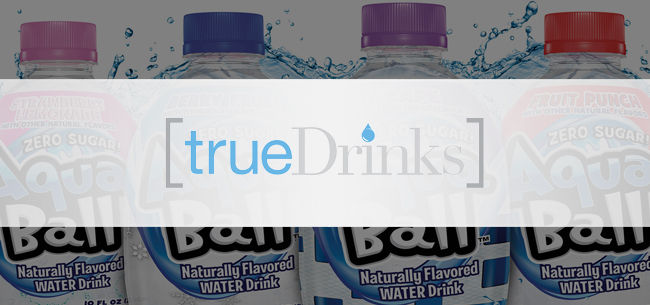
Irvine, Calif.-based True Drinks Holdings, Inc., the maker of the children’s flavored water beverage AquaBall has lost its president and CFO and reduced its staff to two full-time employees as it explores a potential sale of its remaining assets, according to documents filed with the U.S. Securities and Exchange Commission (SEC).
A review of multiple reports filed with the SEC in March and April revealed that the terms of a negotiated settlement between True Drinks and Ontario, Calif.-based bottling partner Niagara Bottling over a breach of its five-year service contract, previously disclosed last October, has put the future of the company in doubt.
On October 9, 2015, True Drinks and Niagara entered into a five-year contract for production of the AquaBall line, in which the bottler agreed to produce 3.2 million, 24-pack cases annually. It also included moving to a hot-fill process in a newly designed bottle. Using hot-fill allowed True Drinks to remove all preservatives from the product, a move that then-CEO Lance Leonard said at the time would help the brand extend into areas “for which preservatives have been a road-block such as natural foods, schools, and quick-serve restaurants.”
In October 2017, Niagara informed True Drinks of a breach of contract, claiming over $18 million in damages for both past due payment obligations and failure to meet certain minimum requirements stipulated in the contact. Several weeks later, in a press release, the company announced it was working with its management team and financial and legal advisors to explore “strategic alternatives focused on maximizing shareholder value,” including a potential sale of the company.
Chief financial officer Dan Kerker resigned from his position on March 6, according to a Form 8-K report filed on March 12.
In a notice dated April 2, True Drinks informed the SEC it could not file its 2017 annual earnings report as originally scheduled because it was unable to finalize certain sections of the Form 10-K while in settlement negotiations with Niagara Bottling.
The report also shed further light on the financial health of the company. Based on available information, True Drinks reported estimated net sales of approximately $4.6 million in 2017, compared to $2.5 million in the prior year, and a net loss of approximately $7.8 million.
The document stated that sales of AquaBall in Q3 and Q4 2017 “did not meet the Company’s expectations” in part due to “high retail pricing of AquaBall created by utilizing distributors,” such as Kalil Bottling Co. in Arizona. To address those issues, the company planned to shift to direct shipping in certain regions and change to a more cost-efficient packaging for its multi-packs, pending the results of settlement negotiations with Niagara.
Three days later, on April 5, True Drinks and Niagara Bottling announced a settlement had been reached for a promissory note for principal amount of approximately $4.6 million, with 5 percent annual interest, and a cash payment of over $2 million.
On April 25, Kevin Sherman resigned as president and chief marketing officer “solely for personal reasons, and to pursue other opportunities,” according to a Form 8-K filing. The report also stated that the company was currently undergoing an internal financial audit and, in the meantime, had discontinued production of AquaBall and reduced staff to two full-time employees.
“Management’s review will likely result in the decision to sell its remaining assets, or a determination to enter into a license or similar agreement with a third party to continue the production, marketing and sale of AquaBall,” read the report.
Calls to True Drinks’ company office requesting comment on this story were not returned. New York-based public relations firm 5W Public Relations told BevNET the company is no longer a client.
In a call with BevNET, True Drinks CEO James J. Greco said the company was working on a plan to move the company forward and confirmed that production of AquaBall has been discontinued. He declined to comment further.